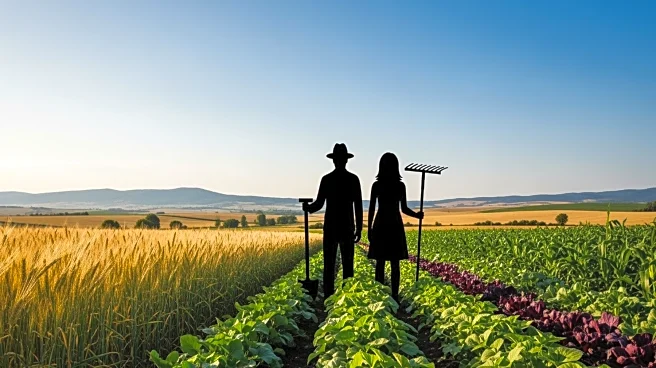What's Happening?
At the 2025 Forum on Women in Agrifood, held in Beijing, global leaders and experts emphasized the need for scientific innovation and inclusive technology to address the gender gap in agriculture. Women,
who produce more than half of the world's food, face significant challenges due to unequal access to technology, finance, and training. The United Nations Food and Agriculture Organization highlighted that women in developing countries produce 60 to 80 percent of food, yet their land productivity is 24 percent lower than men's. Initiatives in China, such as training programs and inclusive financial products, have supported women in agriculture, with over 8 million rural women receiving training and 290,000 cooperatives led by women established. Despite progress, women in developing countries still lack access to critical resources, impacting their productivity and economic contributions.
Why It's Important?
The push for gender equality in agriculture is crucial for enhancing global food security and economic growth. By closing the gender gap, women can significantly increase agricultural productivity, which is vital for feeding growing populations. In Africa, for instance, equitable access to resources for women could boost agricultural GDP by up to 4 percent, leading to transformative economic impacts. Empowering women in agriculture also supports sustainable practices and innovation, contributing to environmental conservation and climate resilience. As women gain access to technology and finance, they can drive advancements in green agriculture and sustainable technology, benefiting society at large.
What's Next?
Efforts to promote gender equality in agriculture are expected to continue, with international organizations and governments likely to expand initiatives that provide women with access to technology, finance, and training. The success of programs in China and Africa may serve as models for other regions, encouraging the adoption of similar strategies worldwide. Stakeholders, including policymakers and agricultural leaders, may focus on creating more inclusive policies and financial products to support female entrepreneurs. The ongoing dialogue at forums like the World AgriFood Innovation Conference will likely influence future policies and collaborations aimed at empowering women in agriculture.
Beyond the Headlines
The movement towards gender equality in agriculture has broader implications for societal norms and cultural shifts. As women gain recognition and support in traditionally male-dominated sectors, it challenges stereotypes and promotes gender equity across industries. This shift can lead to increased representation of women in leadership roles, fostering diversity and innovation. Additionally, empowering women in agriculture can have positive ripple effects on community development, as women often reinvest their earnings into family welfare and education, contributing to long-term societal progress.









